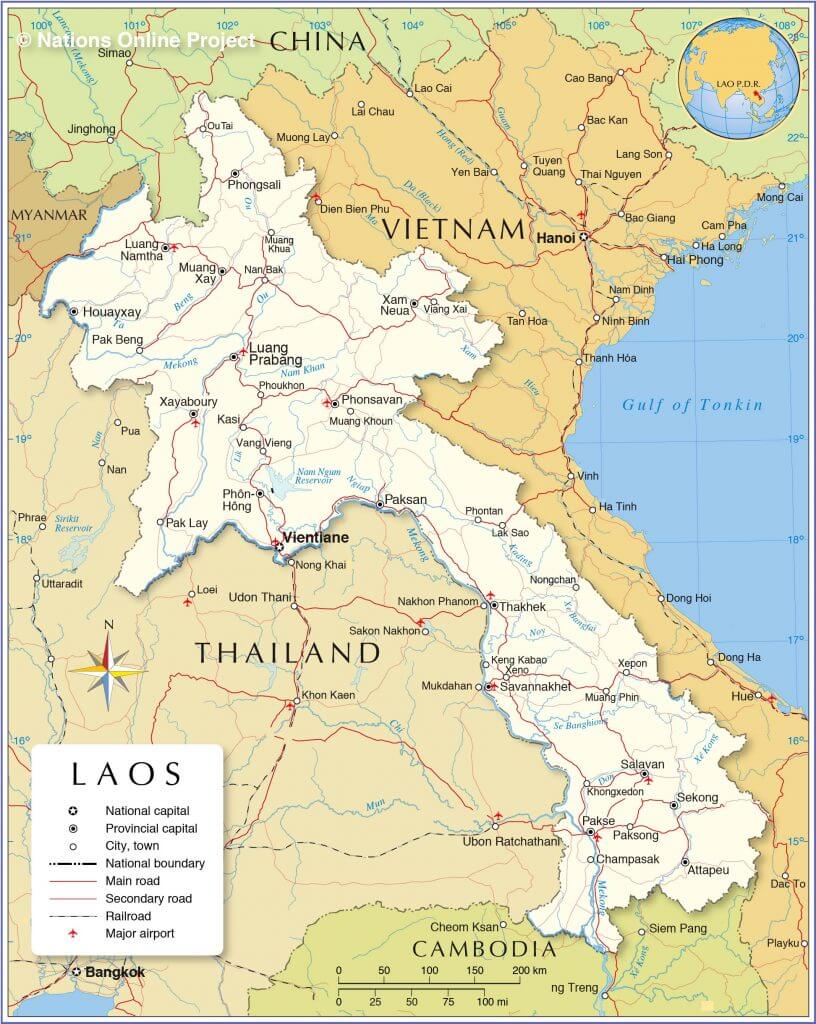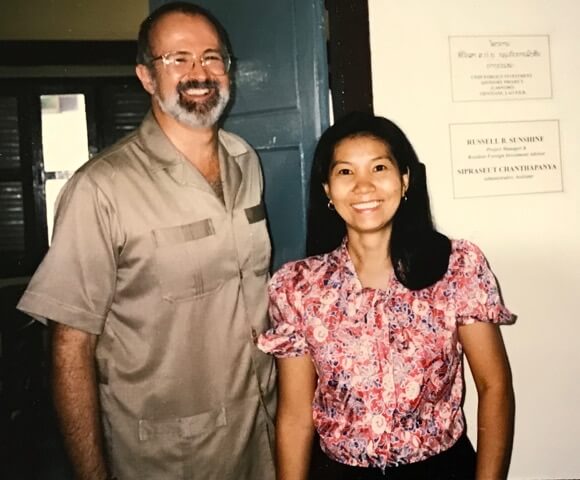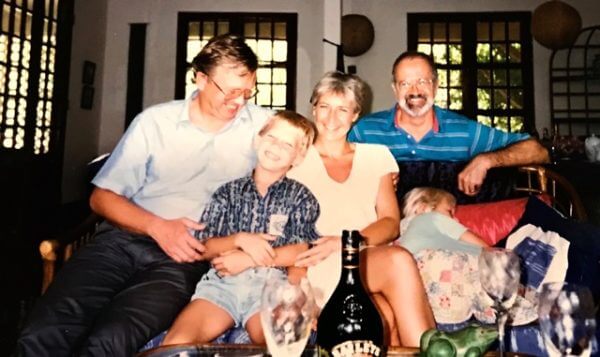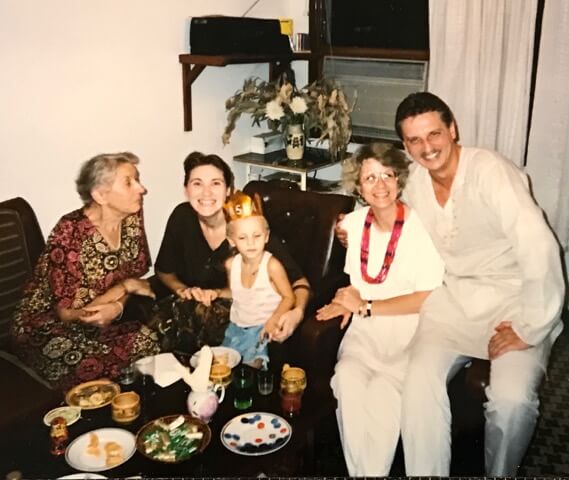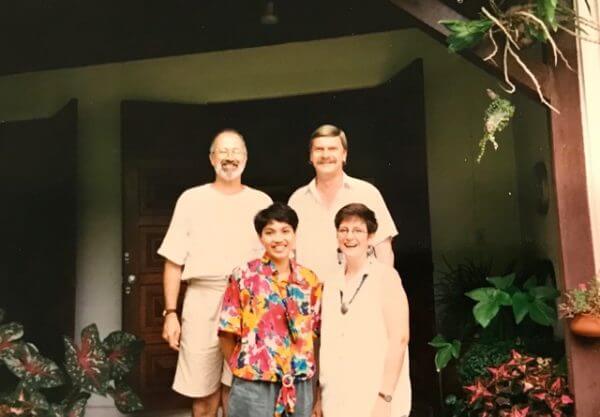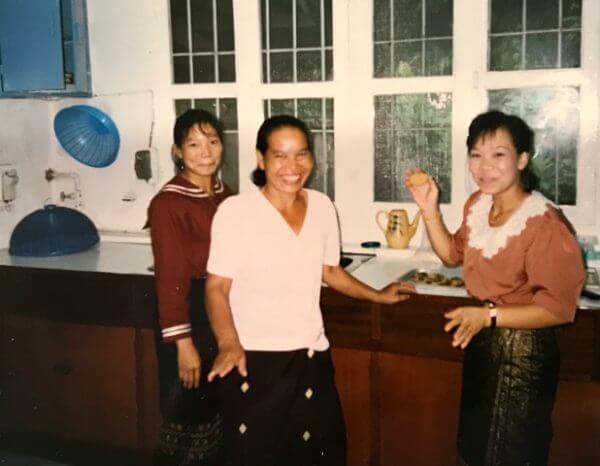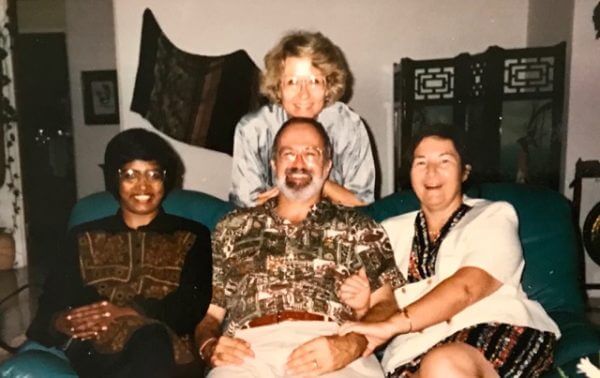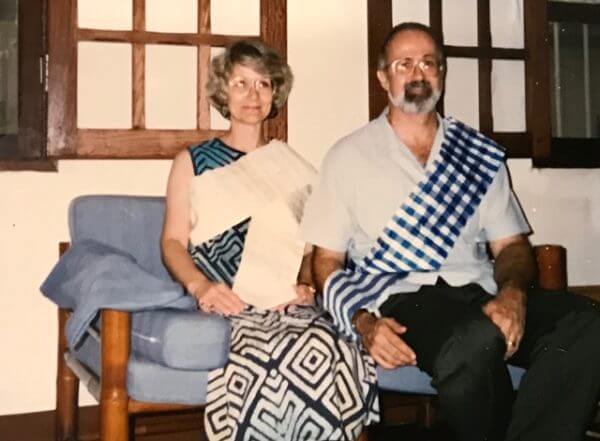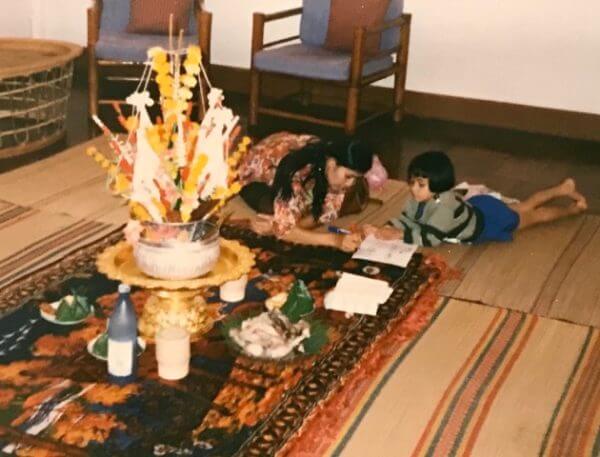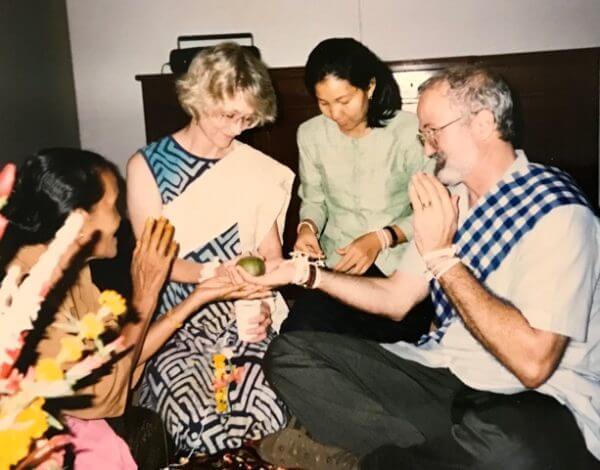#21: 1993 – Leaving Laos
As we neared the end of our stay in Vientiane, we had no inkling of where we’d be going next. This circumstance is fairly common for self-employed professionals in international development. You may just go home for a while and hope for short-term assignments, or you may be moving on to the next long-term one.
We both had ideas for books as a result of our experiences as farang (S. E. Asian term often used for a foreigner, said to be what local people called all Caucasians, because the first ones they encountered were the français). I was thinking in terms of a mystery built around the trials of dependent wives in Vientiane, while Russell was contemplating something more professional, discussing lessons from Laos about attracting and managing foreign investment. We imagined we’d have to write our books during evenings and weekends, not that they might become our main focus during the coming months.
Meanwhile, we were caught up in the minutiae of closing down projects and household, saying goodbye to friends both farang and Lao, finding a new home for feline Mme. Maeo and failing to avoid exhaustion from the traditional round of social events for departing families.
January 13
Last Friday, we had our annual party with the printers. Both Russell and I have major projects involving the Government printers, so we throw a party for them on their 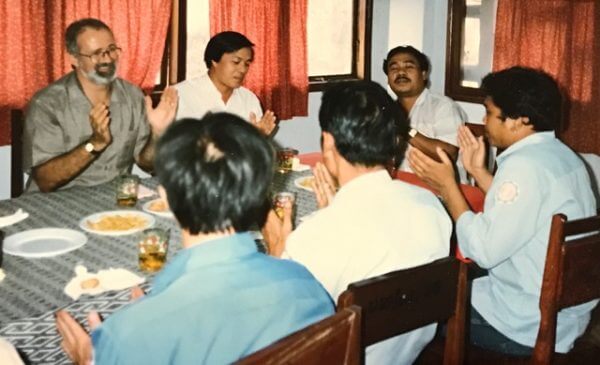 premises to mark the new year. We had beer, wine, whiskey and various sweet and salty snacks. We all took turns singing songs (R&I did a pretty poor rendition of “Down by the Old Mill Stream.”) We danced the lamvong, the Lao circle dance so subtle that you’re almost not moving. It was a very lively party, ending with speeches all around. They’re wonderful, hard-working and caring folks, and we’ll be sorry to leave them.
premises to mark the new year. We had beer, wine, whiskey and various sweet and salty snacks. We all took turns singing songs (R&I did a pretty poor rendition of “Down by the Old Mill Stream.”) We danced the lamvong, the Lao circle dance so subtle that you’re almost not moving. It was a very lively party, ending with speeches all around. They’re wonderful, hard-working and caring folks, and we’ll be sorry to leave them.
May 11
We’ve found someone to rent our house when we depart. They’ll also buy some of the furniture and take over most of the household staff. The only one they may not retain is Khetmani, because they already have a cook/maid. But they’re not very happy with this person, trying to decide whether to use the move as a face-saving way to give her notice. We should know soon what they decide, but it would be wonderful to know that all the staff have jobs when we go.
We had a visit from the director of the Indochina Program at the East-West Center in Hawaii. He happened to be in Vientiane for his own reasons and stopped by the house to meet R and talk about the potential for us to come there to write our books. He made it very clear that he would be much in favor of giving R a grant and other material support. He promised to send a fax when he got back and asked R to prepare a budget and c.v. Russell gave him an outline of his book, so this man will present the outline, c.v. and budget to the committee which takes these decisions, and we’ll see what happens. When he left, he made a point of saying, “I hope the next time we meet we’ll be in Hawaii.” I think it’s too soon to open the champagne, but we just got closer to the goal of writing our books. (Since mine is meant to be more pop and Russell’s is more technical/academic, he’s the one to go after a grant. Then we’d live off it, ending with a book apiece. Actually, we both have ideas for more than one book, if time allows.)
May 19
At last we have a decision on when we’re leaving — July 1. The U.N. Development Programme and the Lao Government met last Friday to assess R’s project and to decide how to complete it. They rated the project very highly and have asked R to return mid-August to shepherd the new foreign investment law through the legislature and help the Government implement it. In between, we’ll see friends and family on both coasts and fly on to Hawaii, where Russell will sign a contract with the East-West Center to be a Fellow while writing two books on lessons from Laos. He’ll then return to Laos August 14 – September 19 while I stay in Honolulu to find house, car, clear shipment of household goods from Laos through Customs, etc.
As you can imagine, all this has shifted us into high gear. We’ve got about six weeks to complete all our projects, decide what to sell and what to pack, then sell and pack, make flight arrangements, say goodbye to friends and colleagues, etc. We both feel it’s do-able, but it’s going to take lots of energy, flexibility, patience and stamina.
May 26
A lot of people, many of them Lao, have been kind enough to say that we should stay, that there is still so much to be done, and that we can make a contribution. But we feel it’s a good time to go. It’s not only that you should “always leave ’em wanting more,” but that you don’t want to become part of the problem. People who stay too long in one place in this business tend to lose their perspective and flexibility and therefore their effectiveness. We’ve seen a lot of changes here — in the physical structures of the city, in the attitudes and behavior of the people. It’s been good to have experienced these changes, but it’s also time to go.
We’ve started thinking about what we’re looking forward to, and here’s a partial list: modern bathrooms with hot water that always works and adequate water pressure for a good shower, safe salads and safe water out of the tap (do you know how lucky you are to be able to wash an apple just by turning on the water?), fresh milk everyday, telephones and faxes that you can take for granted, disciplined traffic (it’s nothing to find a Mack truck coming right at you in your lane; you get off the road or die), daily access to movies, plays, museums, etc. And Russell’s looking forward to cheeseburgers!
Working in international development means saying goodbye all the time. It’ll be hard to leave our staff, both at home and at the office, people whom we’ve come to care about and respect through daily working together. One also comes to know expat friends well in this kind of setting, but many of ours have left or are leaving at about the same time. We’re having a series of small Sunday brunches to bid farewell.
What won’t we miss? Well, I’ll be glad to leave the climate. Nine months of high heat and humidity really do me in. The winter here is glorious, but the rest of the year just has to be endured.
June 2
We went around the house and made a list of what to sell and what to pack. We plan to give the new tenants first choice on buying and then sell what’s left the weekend of June 12th. We hope to have a yard sale and ask that key items be left with us until we go. That’s standard practice here, so we’re hopeful we’ll have a stove and a bed for a couple weeks after the sale.
I’m delighted we’ve found a job for Khetmani. She’ll be working for a new Australian Embassy official, which means she’ll have all sorts of important benefits and lifetime job security. Once you’re in the Embassy system, you rarely leave unless you want to. She’s a young widow with a child, a good cook and a lovely person. We’re so happy she’s going to have this excellent opportunity.
June 9
Russell’s winding things up at the office, and I’m doing the same at the house. We’ve put up signs for our “Giant Leaving Sale” and been pestered hourly by friends, colleagues and strangers about special deals. No special deals. If you want to buy our stove/refrigerator/air conditioners/bikes/books/bed/couch/table or anything else, come on Saturday with the money. It’s the only fair thing to do. We’ve priced the big items, books and tapes, but there’s a lot more to prep before we’re ready. We stay up late every night and sort, toss, pack and price.
The packers arrive 28 June, when we’ll move into a local guest house in a villa downtown. In the meantime, we’re starting to head into a heavy social schedule. It’s the custom here to be feted by virtually everyone who knows you, so our lives are about to be filled with brunches, lunches, cocktails, receptions and dinners. It’ll be fun, but it’ll also be exhausting. Friends who’ve left so far all say that by the time they got on the plane, they could barely walk up the steps!
June 16
I spent all morning trying to put everything in some organized piles so it would be easier for the packers to estimate the volume. Overseas shipping is charged by the cubic meter, not by weight as in the States; it was to my advantage to clump it together so they could get the best idea possible of volume.
June 26
This is the last letter I’ll write you from Vientiane. After two and a half years, it seems strange to think that I won’t be sitting down every week to write you about Lao events and observations. I’ve really enjoyed this chance to be in touch, even if a group letter is a bit impersonal. Thanks for all your cards and letters in return. They helped us feel not so far away.
We have, as promised, been on a giant round of goodbye entertaining. If our stomachs, bottoms, legs and strength hold out, we’ll have experienced a United Nations of cuisines.
Last Friday, the Russians filled us up with piroshki, sausages, potato salad, Russian cole slaw, various pickles and an entree of pork, onions and greens. The evening was especially touching because it was an attempt to give us a typical Russian family party, and they used up all their treats out of a CARE package from home. We felt guilty eating all their special food and drinking all their special drinks, but we knew it was important to them that we enjoy ourselves.
Saturday was the Kowboy Karaoke performance. Lots of fun, even if we did have the inevitable technical glitches. They had the best hamburgers and hot dogs I’ve eaten here. The cast was treated by the Golf Club (venue), so we were filled to the brim with barbecue treats.
Sunday, we hosted our last brunch, featuring chile rellenos casserole, French bread, pomelo (like grapefruit, only better), cookies, coffee, tea, bloody marys and mimosas. That afternoon, we took it easy, reading books and resting — the last quiet time we’ll have until we leave.
Monday, we went to Sakura with Keiko and Hiroshi Okabe and their son, Kota. They’re both friends and colleagues. Keiko was R’s assistant for the series of investment conferences the project hosted last year. We ate well at this relatively new addition to the restaurant scene, thanks to their choosing the food, including lots of things that weren’t on the menu. It was our treat, and we definitely were treated by their choices.
Tuesday was our reception for all R’s Lao colleagues in both the public and private sectors. Khetmani brought in two sisters and we four fixed a combination of Lao and American finger foods. In addition, there was an open bar, manned by our gardener and R’s driver with whiskey, gin, vodka, wine, beer and soft drinks. The Lao love scotch-and-soda, and the two barmen did a land office business.
We had about 30 guests, and as these things are evaluated in Vientiane, it was a great success. Everyone seemed to have a good time, but success here is measured by counting high-ranking heads, and the Lao were gratified that so may HRH came. The HRH all said kind and gracious things about Russell in public. We just wanted to say thank you to all the folks we’d worked with. The other was extra, but it seemed to make a big difference to R’s immediate Lao colleagues.
On Wednesday, the U.N. Development Programme’s Resident Rep (R’s ultimate boss) hosted a very formal lunch with high-ranking Lao officials and the Australian and American Ambassadors, full of champagne toasts and good will all around. That evening, the American Ambassador hosted an informal dinner with members of the American community, again with champagne toasts. I’ll say one thing for living in a former French colony: you get to drink a lot of champagne.
Thursday found us at another lunch, this one hosted at a Lao restaurant by R’s Lao boss and attended by all his immediate colleagues. No champagne, but lots of Lao beer. It was a very intimate, familial setting, very affecting.
Friday saw us at two informal events — lunch with Australian friends at the Aussie Residence and an evening party at the UNDP Res Rep’s. She had a self-proclaimed “bash” for all the folks who’re leaving. There must have been over 100 people there. We were entertained by the staff’s children singing Western songs and dancing the lamvong. Those who were leaving were required to get up and dance. It was all a bit overwhelming for two folks who are nearing exhaustion, but we tried to be good sports.
Tonight, we’re the guests of honor at another dinner, this time hosted by the Australian nurse, who’s become a close friend. Tomorrow night, our Lao friends are pooling their resources to give us a party at one of their houses. We’re very much looking forward to both events.
July 1
HERE WE COME!
Last minute news bulletin:
Russell was given a medal by the Lao Government in appreciation for “service above and beyond…” Other than diplomats, he’s only the second foreigner to receive such an honor.

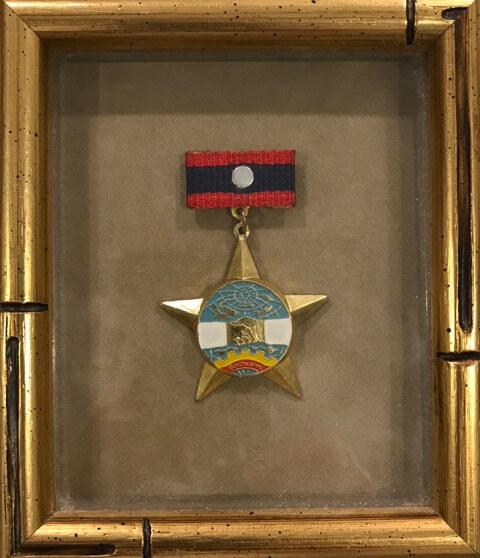
Everything got packed and off with a minimum of hassle. We’re tired but pleased to be coming home for a visit, even if it is too short. But we’re very sad to say goodbye to so many friends — Lao, farang and feline.
See you soon!
During our last days in Vientiane, our household staff, along with Russell’s driver and admin. assistant, hosted a baci (bah-see) for us. There was no time to write home about this most Lao of ceremonies, but the memories informed the description of the one that I wrote in Malice on the Mekong. Let me share those paragraphs here, leaving out the phrases that moved the book’s plot forward. (FYI: Tsing is Wilhelmina’s husband, and Sophia is the woman whose death initiates Anjali’s quest to discover if it was suicide or murder.) This is really our baci I was describing.
Wilhelmina said, “When the time came for us to leave, the staff wanted to host a baci for us. I am sure you have been to one?”
“Many times. It’s a beautiful ceremony.” Anjali recalled Sophia disparaging the baci as an adulteration of Buddhism. But it felt right to Anjali, marking life’s transitions with a ceremony of blessing.
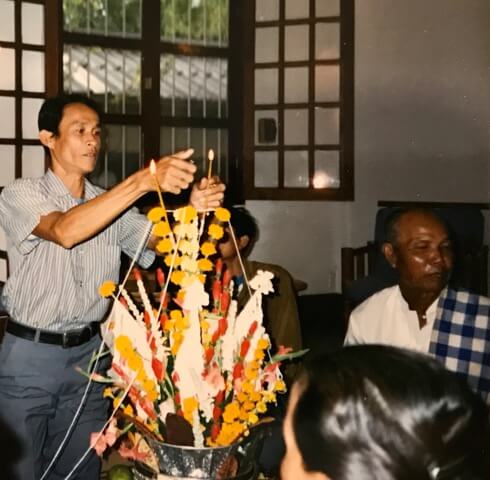 “The family of Tsing’s secretary, Sisomphane, donated their khan,” Wilhelmina began.
“The family of Tsing’s secretary, Sisomphane, donated their khan,” Wilhelmina began.
Anjali pictured the silver urn filled with flowers and tall, narrow candles, the celebrants gathered around.
Wilhelmina continued. “Sisomphane’s father conducted the ceremony. The spouses and children of our extended Lao family were all there. Sisomphane arranged the long, white cords out from the khan, one to Tsing, one to me, the rest to those kneeling on the mats in a circle.”
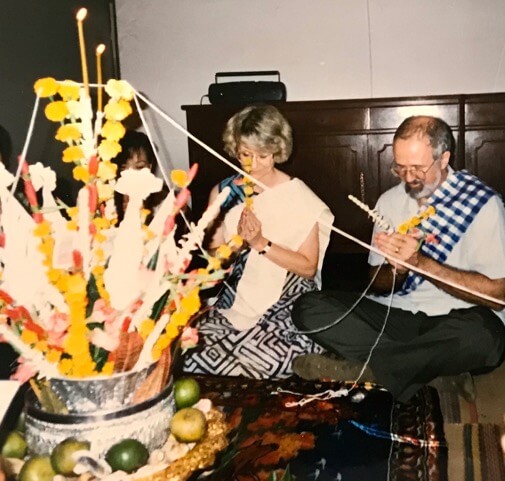 Anjali could see Wilhelmina’s recollection, thin cords carrying blessings from the khan to each participant’s hands clasped in prayer. The leader would have chanted Buddhist sutras and asked the honorees to hold an egg, cooked chicken and fruit as symbols of the blessings of life.
Anjali could see Wilhelmina’s recollection, thin cords carrying blessings from the khan to each participant’s hands clasped in prayer. The leader would have chanted Buddhist sutras and asked the honorees to hold an egg, cooked chicken and fruit as symbols of the blessings of life.
She’d heard translations of the blessings which were quite poetic. Should you fall into the fire, may you not burn. Should you fall into water, may you not drown. Should you fall into mud, may you not be soiled.
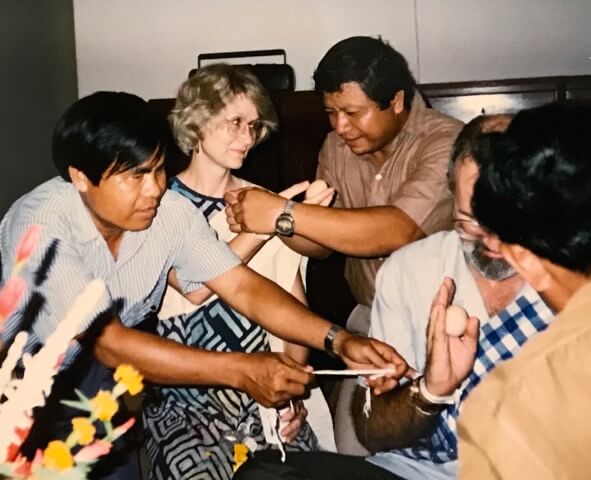 The leader would have taken short cords from the khan and tied them to the honorees’ wrists to bind the blessings. Then everyone else would have taken more such cords and done the same, whispering their own blessings to Tsing and Wilhelmina.
The leader would have taken short cords from the khan and tied them to the honorees’ wrists to bind the blessings. Then everyone else would have taken more such cords and done the same, whispering their own blessings to Tsing and Wilhelmina.
“By the end of the baci,” Wilhelmina said, “our wrists were covered in cords. And they also had cords from us in token of our blessings for them. From the moment that Sisomphane’s father began to chant until the last cord was tied, my cheeks were wet. I was overwhelmed by how our Lao staff had made our lives their lives.”

COMING NEXT MONTH
#22: Guest Contributors
Four guest contributors share their stories about living and working overseas: building a school during a famine, medevacking an 18-month-old in crisis, what to do when your heart attacks, making — and keeping — friends

LET ME HEAR FROM YOU.
Please take a moment to share your thoughts.
Your comments help make the blog better, and I always answer.
* * *
If you enjoyed reading this post, I hope you’ll SUBSCRIBE by clicking on the button below. Every month, when I post a new excerpt from my life overseas, you’ll get an email with a link so you can read the next installment. Subscription is free, and I won’t share your contact information with anyone else. Your subscribing lets me know you’re reading what I write, and that means a lot.

